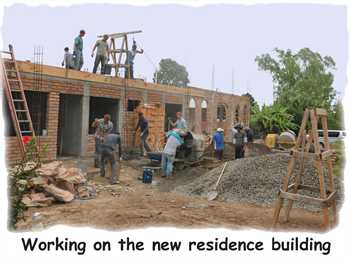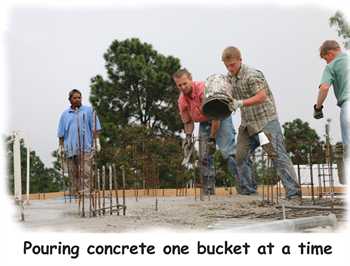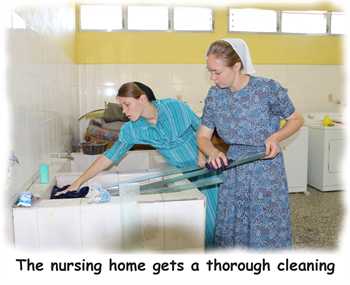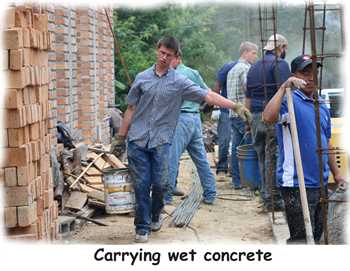
Newsletter - May, 2016
| May, 2016 Assuredly, I say to you, inasmuch as you did it to one of the least of these My brethren, you did it to Me." Matt. 25:40 Published by the Society of the Good Shepherd, P. O. Box 122, Amberson, PA 17210. (717) 349-7033 |
In the United States, Medicare pays nursing home costs for the elderly who are in need. In conservative Anabaptist circles, family and church take care of the elderly. However, in Honduras, there is no Medicare, and most churches don’t have the financial resources to care for the elderly. Those aged persons who have no family to look after them are helpless. They end up wandering the streets—where they eventually die. Their plight moved a Christian brother, Dr. Correa, to start a nursing home in Siguatepeque in 1991 for the indigent elderly. The residents that the home takes in pay nothing to live there. Dr. Correa has taken in people off the street who were literally dying, and he has eased their final days in comfort and cleanliness, in Christ-like love.

Currently, the home has 21 elderly residents, both men and women. There are four caretakers who live at the home. They prepare the meals, do laundry and cleaning, and take care of other needs for the residents. At the present time, these caretakers live in the sleeping quarters with the residents. This is obviously less than ideal, and it makes it difficult to retain good caretakers—particularly married caretakers.

To this end, the Society of the Good Shepherd is currently working with Villa del Cerro to build quarters for the caretakers. We are building a two-story, concrete-block building that will be able to house numerous single caretakers, or even two small families. In March of 2015, a group of Mennonite youth from Pennsylvania went down to Honduras and began work on this project. They were able to pour the foundation for the building and lay the concrete blocks and bricks for the outer walls of the first story before returning.
After that, with funds from our readers, we were able to do more work on the building, using local workmen. In February of this year, another crew came down from some of our local churches. During their time there, they were able to pour the concrete floor for the second story of the caretakers’ quarters and built concrete steps up to the second story.
That might not sound like a huge accomplishment, until you realize what was involved. When the crew arrived, they had to first place support poles inside the ground floor of the new building. They then had to construct a temporary ceiling out of rough lumber to support the wet cement when it was poured. After that they had to put in the plumbing and electricity for the second story, construct wooden forms, and put the rebar in place.

If this had been in the United States, or in one of the large cities in Honduras, cement trucks would have come next with the concrete already mixed. The wet concrete would have then been pumped up to the second story. The concrete work would have all been done in a single day. However, no such services were available to the crew. So the cement was delivered in dry sacks. It had to then be mixed by hand with sand and gravel. To get the wet concrete up to the second floor, the men constructed a simple derrick with a pulley. The concrete was then hand-lifted to the second story by buckets, using the pulley. Once the men got the concrete to the second floor, they had to pour it—one bucket at a time. So getting the second floor poured took two days and enormous backbreaking work, but they got the job accomplished.

A number of young sisters came along with the crew. They gave the nursing home a thorough cleaning inside and out, prepared meals for the men, interacted with the elderly residents, and at times helped with the construction.
When he heard about the project, a Honduran Christian engineer volunteered his time to draw up the plans for this project. Along with Society director Luis Vega and Dr. Correa, he helped to assemble a good work crew of local men, who worked alongside the volunteers from the States. The Society is currently employing these Honduran workmen to continue working on the building until they are able to bring it to completion. It is the donations of our readers that has made this possible, and we want to thank all of those who have helped in this mission of love.
The Society of the Good Shepherd, P. O. Box 122, Amberson, PA 17210 • (717) 349-7033
Click on the following link if you would care to make a donation to the work in Honduras: Donations
|
|